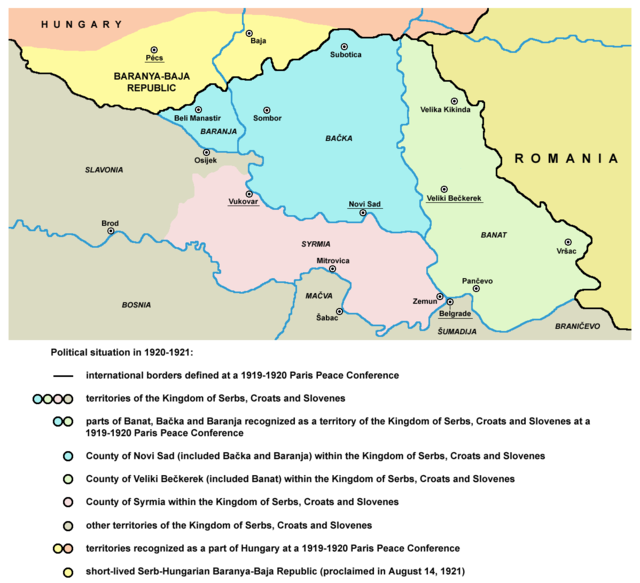Top Qs
Timeline
Chat
Perspective
Banat, Bačka and Baranja
Serbian and Yugoslavian province (1918–1922) From Wikipedia, the free encyclopedia
Remove ads
Banat, Bačka, and Baranya (Serbo-Croatian: Banat, Bačka i Baranja / Банат, Бачка и Барања) was a province of the Kingdom of Serbia and the Kingdom of Serbs, Croats, and Slovenes between November 1918 and 1922. It included the geographical regions of Banat, Bačka, and Baranya and its administrative center was Novi Sad. They were later separated from the country to become SAP Vojvodina in 1945 with the creation of Federal Yugoslavia; smaller parts of Baranya were incorporated into Croatia or ceded to Kingdom of Hungary, while a portion of Banat was ceded to Kingdom of Romania.


Remove ads
Name
The official name of the province was Banat, Bačka, and Baranya, but it was also unofficially known as Vojvodina.
History
Summarize
Perspective
Following the collapse of Austria-Hungary in October 1918, the regions of Banat, Bačka, and Baranya came under control of the Serbian army, in November. They entered Novi Sad on 9 November and dismantled the Hungarian-supported Banat Republic on 15 November. The local ethnic Serb population from these regions had already formed its own administration under the supreme authority of Serb National Board in Novi Sad.
On November 25, 1918, the Great National Assembly of Serbs, Bunjevci, and other Slavs (Велика народна скупштина Срба, Буњеваца и осталих Словена, Velika narodna skupština Srba, Bunjevaca i ostalih Slovena) German: Große Volksversammlung der Serben, Bunjewatzen und der übrigen Slawen) from Banat, Bačka and Baranya, voted that these regions join to the Kingdom of Serbia. The assembly numbered 757 deputies, of whom 578 were Serbs, 84 Bunjevci, 62 Slovaks, 21 Rusyns, 6 Germans, 3 Šokci, 2 Croats, and 1 Hungarian.
The Great People's Assembly decided to join Banat, Bačka, and Baranya to Serbia, and formed a new local administration (government) in these regions known as the People's Administration for Banat, Bačka, and Baranya (Serbo-Croatian: Narodna uprava za Banat, Bačku i Baranju / Народна управа за Банат, Бачку и Барању). The president of the People's Administration was Jovan Lalošević. The People's Council was formed as the legislative body of the province.
On December 1, the Kingdom of Serbia together with the State of Slovenes, Croats, and Serbs formed a new country named Kingdom of Serbs, Croats, and Slovenes.
Although the government in Belgrade accepted the decision that Banat, Bačka and Baranya had joined Serbia, it did not recognize the People's Administration. The People's Administration for Banat, Bačka, and Baranya was active until March 11, 1919, when it held its last session.
Before the peace conference defined the exact borders of the Kingdom of Serbs, Croats and Slovenes, the People's Administration for Banat, Bačka and Baranya also administered parts of Banat, Bačka, and Baranya that today belong to Romania and Hungary.
After the Paris peace conference, the Banat, Bačka, and Baranya province remained in place until the Vidovdan Constitution of 1921 which established the Kingdom of Serbs, Croats, and Slovenes as a unitary state and replaced in 1922 the 8 Pokrajinas (provinces) by 33 new administrative oblasts (counties) ruled from the center.
Remove ads
Population
The population of Banat, Bačka, and Baranya (within the borders defined by the peace conference) was 1,365,596, including 29.1% Serbs, 27.71% Hungarians, 23.10% Germans, and others[1][failed verification – see discussion][2] (such as Romanians). Serbs and Croats together comprised 36.80% of population of the region.[3]
Institutions

The legislative body (parliament) of the province was known as the Great People's Council (Veliki Narodni Savet), while executive body (government) was known as the People's Administration (Narodna Uprava). The Great People's Council consisted of 50 members, which included 35 Serbs, 8 Bunjevci, 5 Slovaks, 1 Krashovan, and 1 Uniate priest.
The People's Administration included following sections:
- Political affairs
- Internal affairs
- Jurisdiction
- Education
- Finances
- Traffic
- Economy
- Food and supplies
- Social reforms
- People's Health
- People's Defence
Remove ads
Administrators
- Jovan Lalošević, president of the People's Administration, people's commissioner for political affairs, and temporary people's commissioner for education
- Petar Konjović, vice-president of the People's Administration
- Jovan Hranilović, temporary president of the Great People's Council
- Slavko Miletić, president of the Great People's Council
- Jovan Latinčić, vice-president of the Great People's Council
- Ignjat Pavlas, people's commissioner for internal affairs
- August Rat, people's commissioner for jurisdiction
- Vladislav Manojlović, people's commissioner for finances
- Stevan Slavnić, people's commissioner for traffic
- Mita Klicin, people's commissioner for economy
- Kosta Popović, people's commissioner for food and supplies
- Dušan Tušanović, people's commissioner for social reforms
- Laza Marković, people's commissioner for people's health
- Dušan Popov, people's commissioner for people's defense
Remove ads
See also
References
Sources
External links
Wikiwand - on
Seamless Wikipedia browsing. On steroids.
Remove ads

